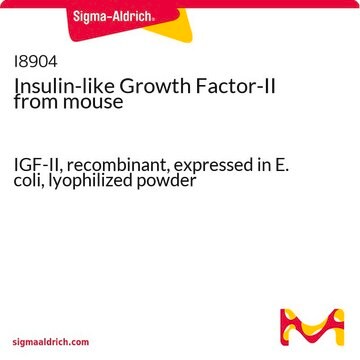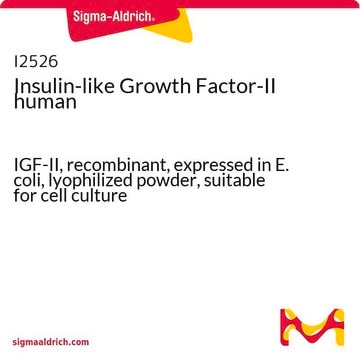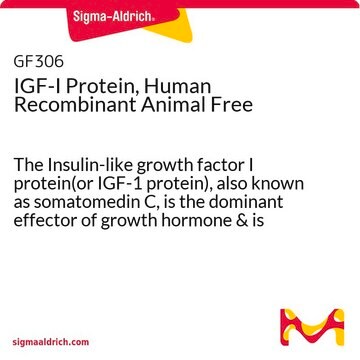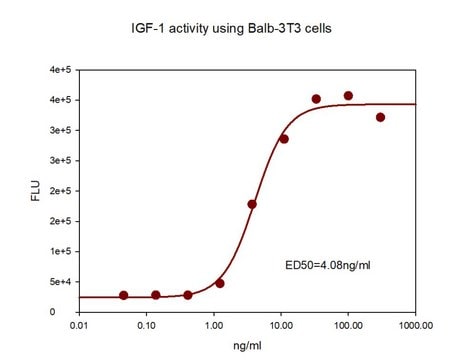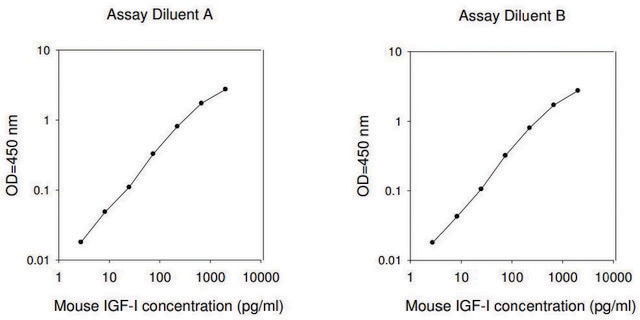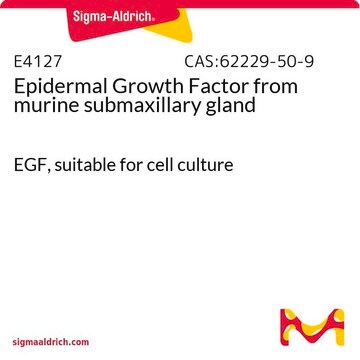I8779
Insulin-like Growth Factor-I from mouse
≥98% (SDS-PAGE & HPLC), recombinant, expressed in E. coli, lyophilized powder, suitable for cell culture
Synonym(s):
IGF-I
About This Item
Recommended Products
Product Name
Insulin-like Growth Factor-I from mouse, IGF-I, recombinant, expressed in E. coli, lyophilized powder, suitable for cell culture
biological source
mouse
Quality Level
recombinant
expressed in E. coli
assay
≥98% (SDS-PAGE and HPLC)
form
lyophilized powder
quality
endotoxin tested
mol wt
predicted mol wt ~7.6 kDa
packaging
glass bottle of 50 μg (in glass insert)
technique(s)
cell culture | mammalian: suitable
impurities
<0.1 ng/mg (LAL test)
UniProt accession no.
storage temp.
−20°C
Gene Information
human ... IGF1(3479)
mouse ... Igf1(16000)
General description
Application
- for the preparation of growth factor cocktail
- as a media supplement for mouse embryonic fibroblasts culture
- as a media supplement to serve as a positive control to investigate
- the effects of Angelica sinensis on myotubes
Biochem/physiol Actions
IGF-I is secreted from the liver into circulation in a process regulated by pituitary growth hormone (GH) and so it mediates the growth-promoting activity of GH. After birth IGF-I expression in most extrahepatic tissues declines and hepatic expression of IGF-I becomes GH-regulated. Expression of IGF-I outside the liver is regulated differently, depending on the specific tissues. For example, gonadotropins and sex steroids regulate IGF-I expression within the reproductive system, while parathyroid hormone and sex steroids regulate IGF-I expression in bone. IGF-I is produced in several human tumors. IGF-I is mitogenic for a variety of cells including fibroblasts, osteoblasts, smooth muscle cells, fetal brain cells, neuroglial cells, and erythroid progenitor cells. IGF-I exerts its actions exclusively through the IGF-I receptor (IGF-IR). IGF-I induces endothelial cell migration and is involved in the regulation of angiogenesis.
Physical form
Analysis Note
related product
Storage Class
11 - Combustible Solids
wgk_germany
WGK 3
flash_point_f
Not applicable
flash_point_c
Not applicable
ppe
Eyeshields, Gloves, type N95 (US)
Choose from one of the most recent versions:
Already Own This Product?
Find documentation for the products that you have recently purchased in the Document Library.
Customers Also Viewed
Articles
Insulin-like Growth Factors (IGF)
Our team of scientists has experience in all areas of research including Life Science, Material Science, Chemical Synthesis, Chromatography, Analytical and many others.
Contact Technical Service

